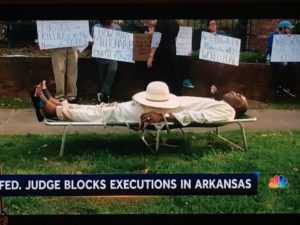A state government commission tasked with investigating claims concerning the ethical conduct or disability of judges on Thursday filed formal charges against six members of the Arkansas Supreme Court for their handling of a case involving a Little Rock judge who also serves as a Baptist pastor.
The Judicial Discipline and Disability Commission, a board established by the state constitution, found probable cause that the justices violated canons of judicial ethics in 2017 when they barred Judge Wendell Griffen from all cases involving the death penalty because he had attended a vigil against capital punishment with members of his church.

Judge Wendell Griffen lies “in solidarity with Jesus” at a death penalty protest on Good Friday in 2017. (Photo/Aubrey Ducker/FB)
Griffen, pastor of Cooperative Baptist Fellowship-aligned New Millennium Church in Little Rock, signed an order in April 2017 granting a pharmaceutical company’s request to block the state from using its drugs as part of Arkansas’ execution by lethal injection protocol.
Later in the day, Griffen and church members attended a Good Friday prayer vigil protesting the state’s plan to execute eight men in 11 days. Griffen was photographed lying motionless on a cot “in solidarity with Jesus, the leader of our religion who was put to death by crucifixion by the Roman Empire.”
The Arkansas Supreme Court reacted by barring Griffen from hearing any cases that involve the death penalty or the state’s execution protocol and referring him to the Judicial Discipline and Disability Commission to determine if he had violated the Code of Judicial Conduct.
The ethics complaint against Judge Griffen has yet to go to the full commission, but new charges by special counsel J. Brent Standridge say the Supreme Court justices ruled improperly on an “extraordinary” complaint against Griffen without giving him proper notice.
“In acting on such matters involving judges, it is important to consider the well-established case law that judges are presumed to be impartial and unbiased and presumptively will act with honesty and integrity in adjudicating cases,” the new complaint says. “A personal belief of a judge, even if expressed publicly by word or conduct, is insufficient to overcome this strong presumption of a judge’s impartiality in ruling on matters of law before the court.”
“A personal belief of a judge, even if expressed publicly by word or conduct, is insufficient to overcome [the] strong presumption of a judge’s impartiality in ruling on matters of law before the court.”
Griffen — a product of the black church tradition of pastors who preach prophetically on social issues — contends that his personal views against the death penalty, while widely known, have nothing to do with his ability to rule impartially on matters of law. For him, he says, it’s a matter of religious freedom.
According to the judicial code, judges “are permitted and encouraged to engage in educational, religious, charitable or civic extrajudicial activities not conducted for profit, even when the activities do not involve the law.
Based on their investigation, the panel found probable cause that Supreme Court justices “acted arbitrarily and capriciously” against Griffen and that the complaint against them “should proceed further before the commission.”
In a process separate from the ethics complaints, the 8th U.S. Circuit Court of Appeals recently dismissed a lawsuit by Griffen accusing the Arkansas Supreme Court of violating his civil rights. Griffen’s attorney has said he plans to appeal to the U.S. Supreme Court.
Previous stories:
Panel says ethics charges against pastor/judge who protested executions can stand
Pastor-judge files appeal of case dismissal
Court upholds decision barring pastor/judge from death penalty cases
Pastor/judge repeats controversial death penalty protest
